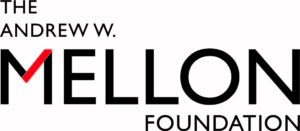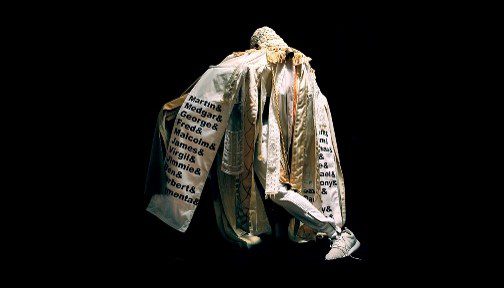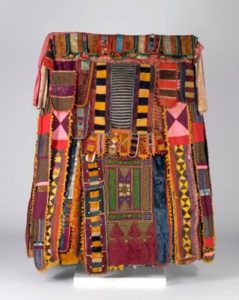Powers Concealed: Egúngúns from Africa and America
The work itself is art as resistance: resistance to Black trauma; resistance to the spectacle of Black death … It’s a way of raising up lost spirits, activating their power, affirming our own.
—Dr. Fahamu Pecou, 2016, in Williams and Hutton 2019
Become a member today to enjoy special savings! Learn more about the perks of membership, including free exhibition tickets.
Despite the pressures of cataclysmic global change, masquerade remains one of the most impressive, prolific, and persistent aspects of African and diaspora artistic production today. Yet, few contemporary masquerades appear in museum galleries or collections. This exhibition examines one genre of masquerade known as egúngún and places a historic example created by a Yorùbá artist in the 1930s in conversation with two contemporary egúngúns by artists and communities in South Carolina and Georgia. Not only is masquerade a hypercontemporary art form but it is truly a global one.
Egúngún means powers concealed and refers to both the masquerade itself and the embodiment of the supernatural power resident in ancestors. As returned ancestors they bridge the living with the spiritual world. Created with layers of sumptuous, paneled fabrics sourced locally and globally, egúngúns typically appear at annual festivals to honor the ancestors and seek blessings for the community. Since ancestors continue to guide and shape us in the present, we honor them when we remember the lessons they have taught us. In remembrance and recognition of education, teaching, and students, Powers Concealed features a newly commissioned ensemble called “Baba Eleko” and presented by Babatunde Akinsegun, Alagba of Egúngún at Oyotunji Village, South Carolina. Visitors can experience the revelatory ways that “powers concealed” are used locally to serve the needs of the present in a digital performance of the Baba Eleko at Oyotunji Village, as performed in May 2021.
Another ensemble created by Atlanta-based artist Dr. Fahamu Pecou, with still photographs and a drawing, examines the political and social violence enacted upon Black male bodies in the United States. Pecou positions the work within Yorùbá religion (Ifá) as an opportunity for those lost—Martin, Medgar, George, Malcolm—to revisit the living with blessings and protection. The epidemic of violent crime against Black men can thus be transformed from what Pecou calls a “spectacle of death” into a radical act of agency that brings power to the community of the living, reminding us not only to witness but also to act.
Brought together for the first time, these three egúngún ensembles connect past with present, spiritual with tangible, and political with individual expression to show how one global masquerade phenomenon can be mobilized to make change, educate, and heal.
Organized by the North Carolina Museum of Art and generously supported by the Andrew W. Mellon Foundation. This exhibition is made possible, in part, by the North Carolina Department of Natural and Cultural Resources; the North Carolina Museum of Art Foundation, Inc.; and the William R. Kenan Jr. Endowment for Educational Exhibitions. Research for this exhibition was made possible by Ann and Jim Goodnight/The Andrew W. Mellon Foundation Fund for Curatorial and Conservation Research and Travel.


Dr. Fahamu Pecou, Untitled 03 (Egungun), 2016, mixed media ensemble, dimensions variable, Courtesy of the artist, Photo: Michael C. Carlos Museum, Emory University

Yoruba artists, Ogbomosho, Oyo State, Nigeria, Egúngún Masquerade Ensemble (paka egúngún), circa 1930–50, cloth, wood, and buttons, H. approx. 60 in., Purchased with funds provided through a bequest from Lucile E. Moorman
